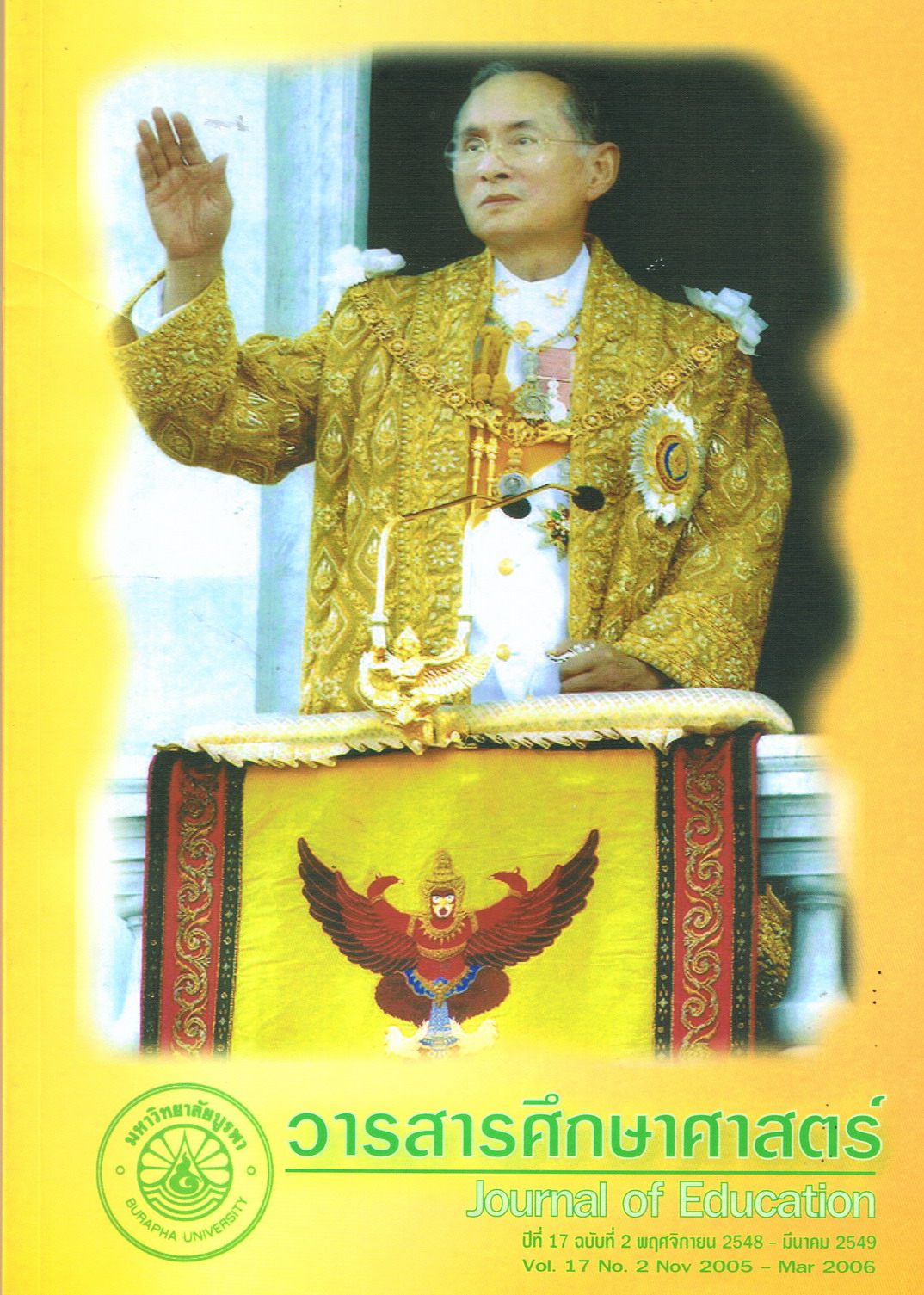บทบาทและความรับผิดชอบของอาจารย์นิเทศก์ ตามการรับรู้ของนิสิตฝึกสอน อาจารย์พี่เลี้ยงและอาจารย์นิเทศก์
คำสำคัญ:
การนิเทศการสอน, นิสิตฝึกสอน, อาจารย์นิเทศก์, อาจารย์พี่เลี้ยงบทคัดย่อ
“การฝึกสอน” ถือเป็นส่วนสำคัญของการผลิตครู อาจารย์นิเทศก์และกระบวนการนิเทศจึงเป็นส่วนสำคัญที่มีผลต่อสัมฤทธิผลของการฝึกสอน หากอาจารย์นิเทศก์ และกระบวนการนิเทศเป็นไปตามบทบาทและความรับผิดชอบที่กำหนดไว้ ย่อมนำมาซึ่งความพึงพอใจของทุกฝ่ายที่เกี่ยวข้อง และสามารถประเมินจุดแข็งและจุดที่ควรได้รับการปรับปรุงได้อย่างต่อเนื่อง ซึ่งถือเป็นกระบวนการพัฒนาวิชาชีพครูที่สำคัญคณะศึกษาศาสตร์ มหาวิทยาลัยบูรพาได้ ดำเนินการเกี่ยวกับการฝึกสอนมาเป็นเวลา ประมาณ 50 ปี แต่การวิจัยเกี่ยวกับการฝึกสอนยังมีน้อย โดยเฉพาะทางด้านการนิเทศการสอน การวิจัยนี้จึงมีจุดมุ่งหมายเพื่อศึกษาบทบาทและหน้าที่ความรับผิดชอบของอาจารย์นิเทศก์ตามการรับรู้ของนิสิตฝึกสอน อาจารย์พี่เลี้ยง และอาจารย์นิเทศก์ เครื่องมือที่ใช้ในการวิจัยนี้เป็นแบบสอบถามปลายปิด ประกอบด้วยบทบาท และความรับผิดชอบโดยทั่วไปของอาจารย์นิเทศก์ 14 หน้าที่ ของเอ็นช์ (Enz) ที่แปลเป็นภาษาไทยแล้วและได้ส่งไปให้อดีตนิสิต ฝึกสอน อาจารย์พี่เลี้ยงและอาจารย์นิเทศก์ คณะศึกษาศาสตร์ มหาวิทยาลัยบูรพา ที่ออกปฏิบัติหน้าที่ของแต่ละฝ่าย ในช่วงระยะเวลาการฝึกสอน ภาคเรียนที่ 2 ปีการศึกษา 2546 จากกลุ่มผู้ตอบแบบสอบถามดังกล่าวได้แบบสอบถามที่สมบูรณ์ กลับมาจากนิสิต 157 คน อาจารย์พี่เลี้ยง 72 คน และอาจารย์ นิเทศก์ 26 คน รวมแบบสอบถามที่นำมาวิเคราะห์ทั้งหมด 255 ฉบับ แบบสอบถามกำหนดให้ผู้ตอบแบบสอบถามจัดอันดับ บทบาทและความรับผิดชอบของอาจารย์นิเทศโดยทั่วไป 14 หน้าที่ โดยให้จัดอับดับความสำคัญมากที่สุดไปสู่น้อยที่สุด กำหนดให้อันดับที่ 1 มีความสำคัญมากที่สุด และอันดับที่ 14 มีความสำคัญ น้อยที่สุด ผลการวิจัยพบว่านิสิตฝึกสอน อาจารย์พี่เลี้ยง และอาจารย์นิเทศก์ รับรู้เกี่ยวกับบทบาทของอาจารย์นิเทศก์ที่สำคัญที่สุดเป็นอันดับที่ 1 เหมือนกันได้แก่ “บทบาทพี่เลี้ยง” แต่นิสิตฝึกสอนรับรู้เกี่ยวกับบทบาทอาจารย์นิเทศก์ ในอันดับที่ 2 และที่ 3 แตกต่างจากการรับรู้ของอาจารย์พี่เลี้ยงและอาจารย์นิเทศก์ ดังนี้ อันดับที่ 2 ได้แก่ “บทบาทผู้ตีความ” และอันดับที่ 3 “บทบาทเป็นแหล่งทรัพยากรทางวิชาชีพ” ในขณะที่อาจารย์พี่เลี้ยงและอาจารย์นิเทศก์ รับรู้เกี่ยวกับบทบาทของอาจารย์นิเทศก์ในอันดับที่ 2 และอันดับที่ 3เหมือนกัน คือ “บทบาทเป็นแหล่งทรัพยากรทางวิชาชีพ” และ “บทบาทผู้ตีความ” ตามลำดับในส่วนหน้าที่ความรับผิดชอบของอาจารย์นิเทศก์ พบว่า นิสิตฝึกสอน อาจารย์พี่เลี้ยงและอาจารย์ นิเทศก์ มีการรับรู้แตกต่างกันกล่าวคือนิสิตฝึกสอน ให้ความสำคัญเกี่ยวกับความรับผิดชอบของอาจารย์นิเทศก์ที่สำคัญที่สุดเป็นอันดับที่ 1 ในเรื่อง“ส่งเสริมและให้กำลังใจนิสิตฝึกสอน ในการปฏิบัติการฝึกสอน” ในขณะที่อาจารย์พี่เลี้ยงให้ความสำคัญมากที่สุด เป็นอันดับที่ 1 ในหน้าที่ตรวจแผนการสอนและสังเกตการสอนของนิสิต รวมทั้งให้ข้อมูลป้อนกลับ” แต่อาจารย์นิเทศก์ ให้ความสำคัญที่สุด เป็นอับดับที่1 ทั้ง 2 รายการ ที่นิสิตฝึกสอน และอาจารย์พี่เลี้ยงรับรู้และให้เป็นอันดับที่ 1 นั่นคือ “ตรวจแผนการสอน และสังเกต การสอนของนิสิตฝึกสอนรวมทั้งให้ข้อมูลป้อนกลับ” และ“ส่งเสริม และให้กำลังใจนิสิตฝึกสอนในการปฏิบัติการฝึกสอน” อย่างไรก็ตาม ทั้งนิสิตฝึกสอน อาจารย์พี่เลี้ยงและอาจารย์นิเทศก์ รับรู้เกี่ยวกับบทบาทและความรับผิดชอบของอาจารย์นิเทศก์ที่สำคัญเป็น อันดับที่ 3 เหมือนกัน คือ “ผู้อำนวยความสะดวกในการพบพูดคุย เกี่ยวกับข้อมูลป้อนกลับระหว่างนิสิตฝึกสอน อาจารย์พี่เลี้ยง และอาจารย์นิเทศก์” จากข้อมูลข้างต้น สามารถสรุปได้ว่าบทบาทและความรับผิดชอบของอาจารย์นิเทศก์ตามการรับรู้ของนิสิตฝึกสอน อาจารย์พี่เลี้ยงและอาจารย์นิเทศก์ ที่สำคัญมากที่สุดเป็นอันดับที่ 1 ได้แก่ “บทบาทพี่เลี้ยง” ในความรับผิดชอบที่สำคัญที่สุด 2 หน้าที่คือ “ตรวจแผนการสอน และสังเกตการสอนของนิสิตฝึกสอน รวมทั้งให้ข้อมูลป้อนกลับ” และ “ส่งเสริมและให้กำลังใจนิสิตฝึกสอนในการปฏิบัติการฝึกสอน” รองลงมาเป็น อันดับที่ 2 ได้แก่ “บทบาทผู้ตีความ” ในความรับผิดชอบที่สำคัญเป็นอันดับที่ 2 คือ “ผู้อำนวยความสะดวกในการพบพูดคุยเกี่ยวกับข้อมูลป้อนกลับระหว่างนิสิตฝึกสอน อาจารย์พี่เลี้ยง และอาจารย์นิเทศก์”
Student teaching is an integral part of a teacher education program. Thaerefore, university supervisor and supervision process play key roles in the success of a student teaching program. An effective supervisor and supervision process bring about satisfaction among all involved and undoubtedly contribute to professional development of teachers. Burapha University (BUU) Faculty of Education has conducted student teaching around 50 years, however, only limited number of research related to student teaching, especially in the part of supervision, has been carried out. Thus the faculty is in the state of lacking research evidence to make this aspect of work move forward. The primary objective of this research was to study roles and responsibilities of university supervisors as perceived by student teachers, school supervisors and university supervisors. A set of closed-end questionnaires containing 14 functions of a university supervisor, grouped into 3 roles - “Mentor”, “Interpretor”, and “Professional resource”, developed by Enz, was distributed to former student teachers (ST), school supervisors (SCHS) and university supervisors (BUUS) participating in the 2003 BUU Faculty of Education Student Teaching Practicum (November 2003-February 2004). Completed set of questionnaires were returned by 157 ST, 72 SCHS and 26 BUUS. Then the total participants were 255. Key request in the questionnaire was to have the three groups of respondents rank, according to their perception, the roles and responsibilities of a university supervisor in order of importance. Results showed that ST, SCHS and BUUS perceived that the most important role of a university supervisor was “Mentor”. However, the student teachers perceived the second and third important roles of a university supervisor in “Interpretor” and “Professional resource” respectively while the school and university supervisors perceived “Professional resource” and “Interpretor” roles at the second and third important roles of a university supervisor. In the part of responsibilities of a university supervisor, the participating groups perceived differently. The student teachers perceived that the most important responsibility of a university supervisor was to “provide moral support and encouragement to the student teacher” while the school supervisors perception was to “ check student teacher’s lesson plans, observe, teaching performance and provide feedback” . However, the university supervisors perceived both functions which perceived by the student teachers (Provide moral support and encouragement to the student teacher.) and school supervisors (Check student teacher’s lesson plans, observe teaching performance, and provide feedback) were the most important responsibilities of a university supervisor. In addition, all groups of the participants perceived “Facilitating feedback conferences between student teacher, school supervisor and university supervisor” as the third important responsibility of a university supervisor. The data thus suggested that the most important role of a university supervisor perceived by student teachers, school and university supervisors was “Mentor” . The two most important responsibilities under this role were “Checking student teacher’s lesson plans, observe teaching performance, and provide feedback” and “Providing moral support and encouragement to the student teachers”. The second important role of a university supervisor perceived by the participants was “interpretor”. The main responsibility under this role was to “Facilitate feedback conferences between a student teacher and the two supervisors.”
ดาวน์โหลด
เผยแพร่แล้ว
รูปแบบการอ้างอิง
ฉบับ
ประเภทบทความ
สัญญาอนุญาต
ลิขสิทธิ์ของบทความที่ปรากฏในวารสารศึกษาศาสตร์ มหาวิทยาลัยบูรพา เป็นของวารสารศึกษาศาสตร์ มหาวิทยาลัยบูรพา ทั้งนี้บทความทุกเรื่องผ่านการตรวจสอบความถูกต้องทางวิชาการจากผู้ทรงคุณวุฒิ ข้อความและข้อมูลของบทความในวารสารฯ เป็นแนวคิดของผู้แต่ง มิใช่เป็นความคิดเห็นของกองบรรณาธิการ และมิใช่ความรับผิดชอบของคณะศึกษาศาสตร์ มหาวิทยาลัยบูรพา ไม่สงวนลิขสิทธิ์การนำไปใช้ประโยชน์ทางวิชาการแต่ต้องอ้างอิงแสดงแหล่งที่มาและอยู่ในขอบเขตของกฎหมายลิขสิทธิ์



